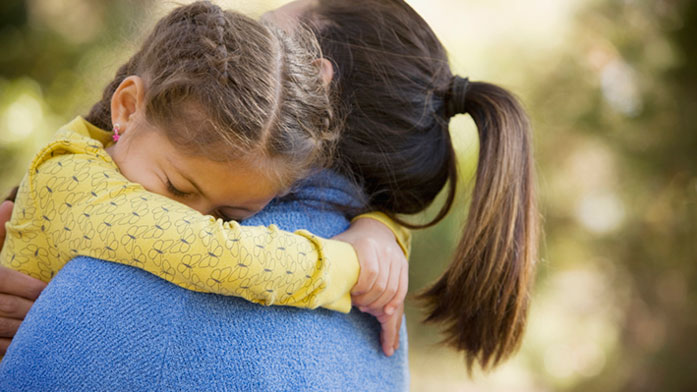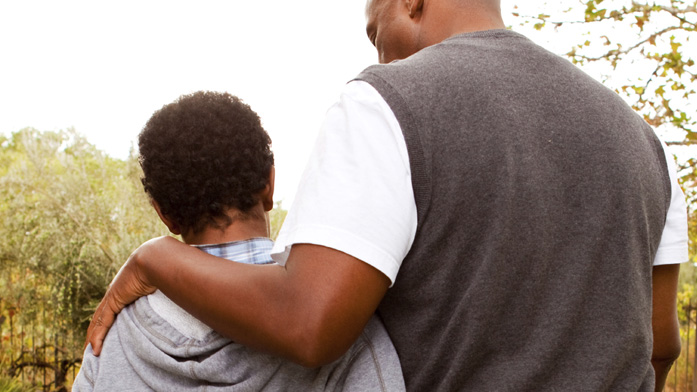Helping Children & Teens Cope with Trauma

Talk with your children about their feelings. Children from preschoolers to young adults need to hear that it is normal to feel frightened. When you acknowledge these feelings, it will help them to heal.
Remember that you do not have to "fix" how your child feels. Instead, focus on helping them understand and cope with their experiences. Healing is a gradual process for most children, and some may need professional help.
If signs of stress do not subside after a few weeks, or if they get worse, consider consulting a mental health professional who has special training in working with children or teens.
RESOURCES FOR CHILDREN
Top Parenting Tips in Uncertain Times >
Caring for Children During a Disaster – CDC website:
www.cdc.gov/childrenindisasters
Sesame Street has videos and other resources for parents and children coping with traumatic experiences.
How to Talk to Kids About School Shootings
Strategies for dealing with anxiety – your kid's and your own.
https://childmind.org/article/anxiety-school-shooting/
"Help Kids Cope" App – This free mobile app provides information to help parents and other caregivers, teachers, counselors, and other prepare for and talk about disasters with kids. The app features tips and checklists to help with disaster preparation; information about how children typically respond to disasters; and links to kids’ books, activities, and other resources. Developed by the National Child Traumatic Stress Network and other organizations, the app runs on iPhone, iPad, and iPod Touch.
www.nctsn.org/content/help-kids-cope
Local Resources:
VCBH Crisis & Referral Line
1-866-998-2243
Free • Confidential • 24/7
Emergency: Call 911
Interface Children & Family Services
www.icfs.org
Call 1-800-636-6738
Services offered:
- Family Violence Response Team
- Safe Haven Emergency Shelter
- Safe Journey Transitional Shelter
- Women’s Support Group
2-1-1 Ventura County Information & Referral
Call 2-1-1
Project Connecting with my Peers:
Educating women about the early signs of depression
Oxnard:
(805) 483-1166
Santa Paula / Fillmore:
(818) 427-5444
Clinicas del Camino Real
clinicas.org
Oxnard, Santa Paula, Simi Valley, Thousand Oaks, Ventura
(805) 647-6353
The Coalition for Family Harmony
thecoalition.org
24-Hour Bilingual Hotline:
1-800-300-2181
Email: gethelp@thecoalition.org
National Resource:
The National Domestic Violence Hotline
thehotline.org
Call 1-800-799-7233, 24 hours a day, 7 days a week
Anonymous & confidential
HELP YOUR PRESCHOOLER
- Stick to regular family routines.
- Make an extra effort to provide comfort and reassurance.
- Avoid unnecessary separations.
- Permit a child to sleep in the parents’ room temporarily.
- Encourage child to express emotions through play, drawing and storytelling.
- Limit exposure to TV.
- Play outside together.
- Develop a family emergency plan for future emergencies.
HELP YOUR ELEMENTARY AGE CHILDREN
- Provide extra attention and consideration.
- Be there to listen to your teen, but don't force them to talk about feelings and emotions.
- Encourage discussion of traumatic experiences among peers.
- Promote involvement with community recovery work.
- Urge participation in physical activities.
- Encourage resumption of regular social and recreational activities.
- Rehearse safety plan for possible future incidents.
HELP YOUR TEENAGERS
- Provide extra attention and consideration.
- Be there to listen to your teen, but don't force them to talk about feelings and emotions.
- Encourage discussion of traumatic experiences among peers.
- Promote involvement with community recovery work.
- Urge participation in physical activities.
- Encourage resumption of regular social and recreational activities.
- Rehearse safety plan for possible future incidents.
Source: SAMHSA

